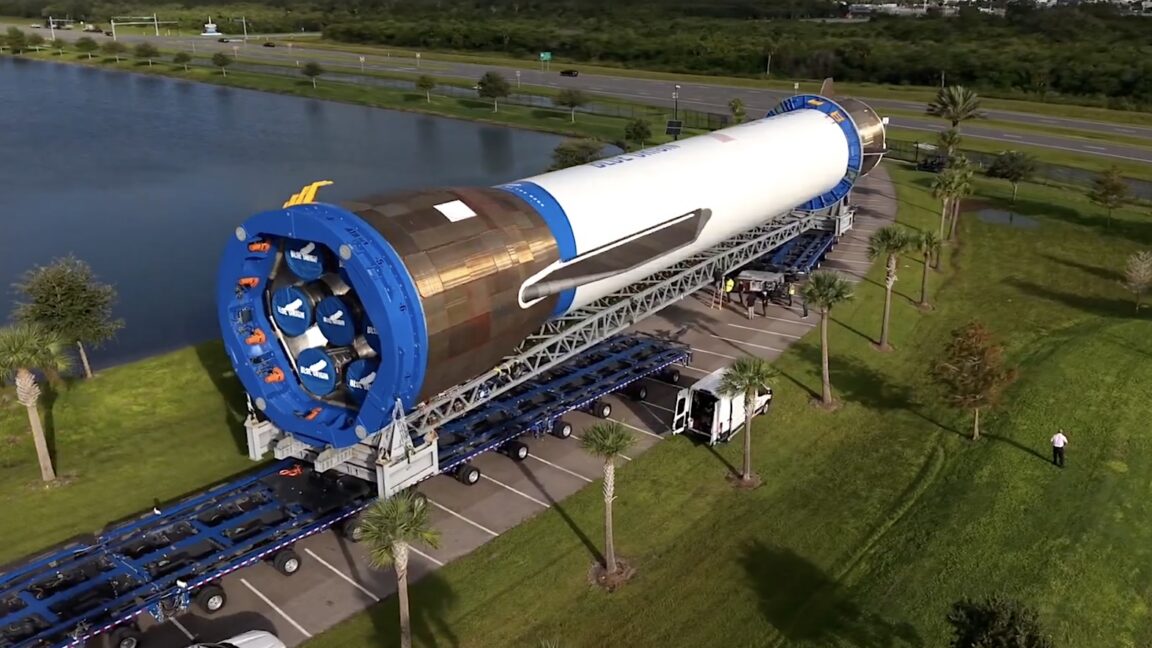Science
Blue Origin Expands Operations Amid Ongoing Space Industry Growth

Space exploration continues to thrive despite a federal government shutdown in the United States. Both military operations and NASA’s preparations for the upcoming Artemis II mission, scheduled for early next year, remain unaffected. The International Space Station continues its operations with seven crew members in low-Earth orbit, while various commercial companies sustain momentum in space activities.
The shutdown has implications for federal employees and military personnel, who may soon miss paychecks if a resolution is not reached. Nevertheless, the majority of the space industry appears insulated from political turbulence, demonstrating the growing role of private companies in this sector.
Concerns About Space Debris
A recent analysis of space debris highlights the persistent issue of defunct rockets in low-Earth orbit. According to a report presented by Darren McKnight at the International Astronautical Congress in Sydney, 76% of the 50 most concerning pieces of debris were launched before 2000. The report indicates that 88% of these objects consist of rocket bodies.
China’s activities have raised alarms, with McKnight noting that since January 1, 2024, 26 rocket bodies have been abandoned in low-Earth orbit, 21 of which were from China. This trend, along with other historical data, poses risks, as collisions with even small objects can create additional debris, potentially triggering a cycle of collisions known as Kessler Syndrome.
Blue Origin’s New Ventures
On a positive note, Blue Origin, the aerospace company founded by Jeff Bezos, successfully launched its sixth crewed flight of the New Shepard rocket in recent days. This mission, which included six passengers, marked the 36th flight of the suborbital vehicle. With a focus on increasing its flight rate, Blue Origin has now transported a total of 86 individuals to space. The company aims to launch approximately once a month, thereby solidifying its position in the space tourism and suborbital research markets.
In a strategic expansion, Blue Origin secured a $78.2 million contract from the U.S. Space Force to construct a new payload processing facility at Cape Canaveral Space Force Station. This facility is expected to support up to 16 missions annually, catering to both military and commercial clients. The establishment of this infrastructure highlights the Space Force’s need to address bottlenecks in payload processing capabilities, which are crucial for increasing launch frequencies.
NASA’s Continued Investment in Advanced Technologies
NASA has also taken steps to advance its capabilities by awarding a $4 million contract to the Ad Astra Rocket Company for the development of its Variable Specific Impulse Magnetoplasma Rocket (VASIMR). Founded by former NASA astronaut Franklin Chang-Diaz, the VASIMR engine is designed to facilitate faster travel to Mars, potentially reducing the journey to as little as 45 days using nuclear power.
Despite facing challenges over the years, including technical hurdles and funding instability, Ad Astra claims it is nearing flight readiness for the engine. The new contract will support the development of critical subsystems, paving the way for future testing and potential space missions.
Looking Ahead: Future Launch Plans
In other developments, Gilmour Space Technologies, an Australian startup, announced plans to return to the launch pad next year following an unsuccessful orbital flight attempt. The company’s CEO, Adam Gilmour, expressed confidence in their ability to launch again, emphasizing their strong capital position despite previous setbacks.
Meanwhile, SpaceX has resumed launches after a brief hiatus, completing its first launch in 12 days with a successful deployment of 28 Starlink satellites. The company faces ongoing challenges from weather conditions, which have recently hampered operations at its Florida launch site.
As the space industry progresses, leadership changes also occur. Martin Sion, CEO of ArianeGroup, is set to take over as head of French train manufacturer Alstom in April 2026. His departure comes amidst efforts to improve the production and launch cadence of the Ariane 6 rocket, which has faced delays.
With various companies innovating and expanding their operations, the future of space exploration looks promising. The coming months will reveal how these developments unfold, with multiple launches scheduled, including the next test flight of SpaceX’s Starship and Super Heavy, expected to take place soon.
-

 Science3 months ago
Science3 months agoToyoake City Proposes Daily Two-Hour Smartphone Use Limit
-

 Health4 months ago
Health4 months agoB.C. Review Reveals Urgent Need for Rare-Disease Drug Reforms
-

 Top Stories4 months ago
Top Stories4 months agoPedestrian Fatally Injured in Esquimalt Collision on August 14
-

 Technology3 months ago
Technology3 months agoDark Adventure Game “Bye Sweet Carole” Set for October Release
-

 World3 months ago
World3 months agoJimmy Lai’s Defense Challenges Charges Under National Security Law
-

 Lifestyle4 months ago
Lifestyle4 months agoVictoria’s Pop-Up Shop Shines Light on B.C.’s Wolf Cull
-

 Technology3 months ago
Technology3 months agoKonami Revives Iconic Metal Gear Solid Delta Ahead of Release
-

 Technology3 months ago
Technology3 months agoApple Expands Self-Service Repair Program to Canada
-

 Technology3 months ago
Technology3 months agoSnapmaker U1 Color 3D Printer Redefines Speed and Sustainability
-

 Technology3 months ago
Technology3 months agoAION Folding Knife: Redefining EDC Design with Premium Materials
-

 Technology4 months ago
Technology4 months agoSolve Today’s Wordle Challenge: Hints and Answer for August 19
-

 Business4 months ago
Business4 months agoGordon Murray Automotive Unveils S1 LM and Le Mans GTR at Monterey









